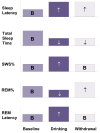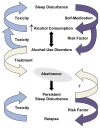Alcohol's effects on sleep in alcoholics
- PMID: 11584550
- PMCID: PMC2778757
Alcohol's effects on sleep in alcoholics
Abstract
Sleep problems, which can have significant clinical and economic consequences, are more common among alcoholics than among nonalcoholics. During both drinking periods and withdrawal, alcoholics commonly experience problems falling asleep and decreased total sleep time. Other measures of sleep are also disturbed. Even alcoholics who have been abstinent for short periods of time (i.e., several weeks) or extended periods of time (i.e., several years) may experience persistent sleep abnormalities. Researchers also found that alcoholics are more likely to suffer from certain sleep disorders, such as sleep apnea. Conversely, sleep problems may predispose some people to developing alcohol problems. Furthermore, sleep problems may increase the risk of relapse among abstinent alcoholics.
Figures


References
-
- Adamson J, Burdick JA. Sleep of dry alcoholics. Archives of General Psychiatry. 1973;28:146–149. - PubMed
-
- Aldrich MS. Neurobiology of sleep. In: Aldrich MS, editor. Sleep Medicine. New York: Oxford; 1999. pp. 27–38.
-
- Asheychik R, Jackson T, Baker H, et al. The efficacy of L-tryptophan in the reduction of sleep disturbance and depressive state in alcoholic patients. Journal of Studies on Alcohol. 1989;50:525–532. - PubMed
-
- Aubin HJ, Goldenberg F, Benoit O, et al. Effects of tetrabamate and of diazepam on sleep polygraphy during subacute withdrawal in alcohol-dependent patients. Human Psychopharmacology. 1994;9:191–195.
-
- Becker HC. Alcohol withdrawal: Neuroadaptation and sensitization. CNS Spectrums. 1999;4:38–40. 57–65.
Publication types
MeSH terms
Substances
Grants and funding
LinkOut - more resources
Full Text Sources
Other Literature Sources
Medical
